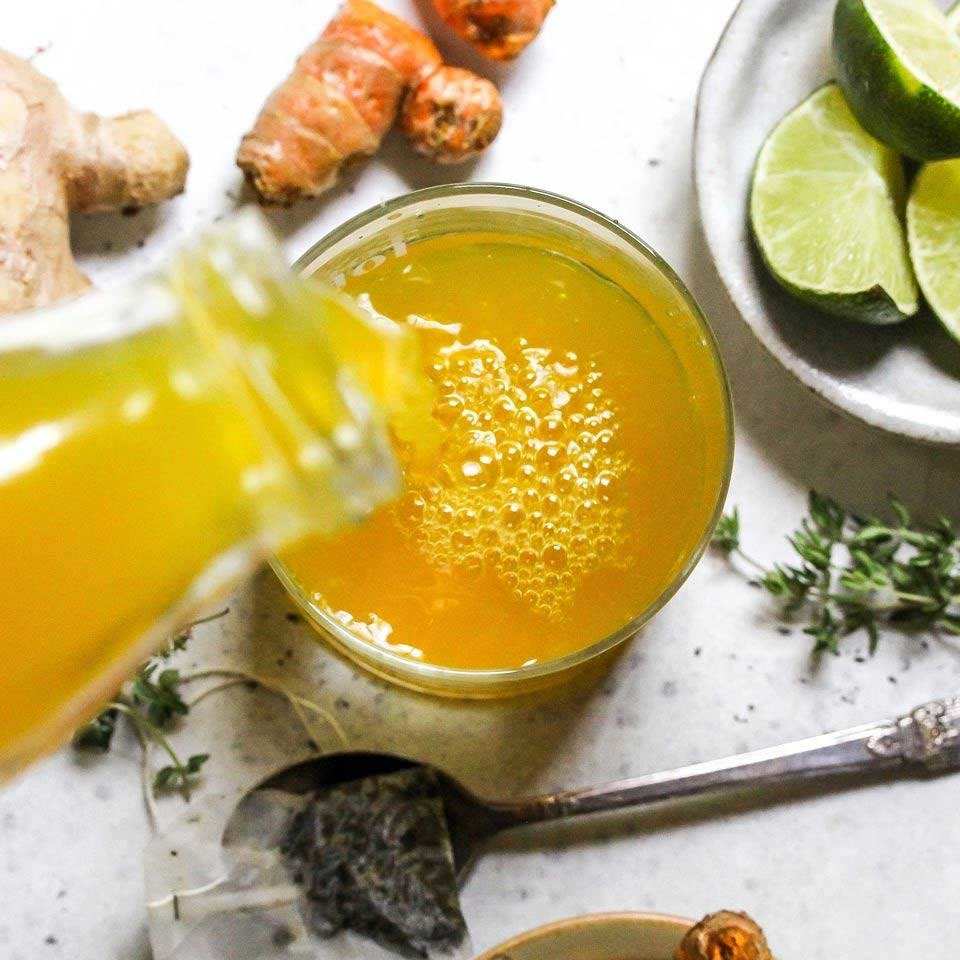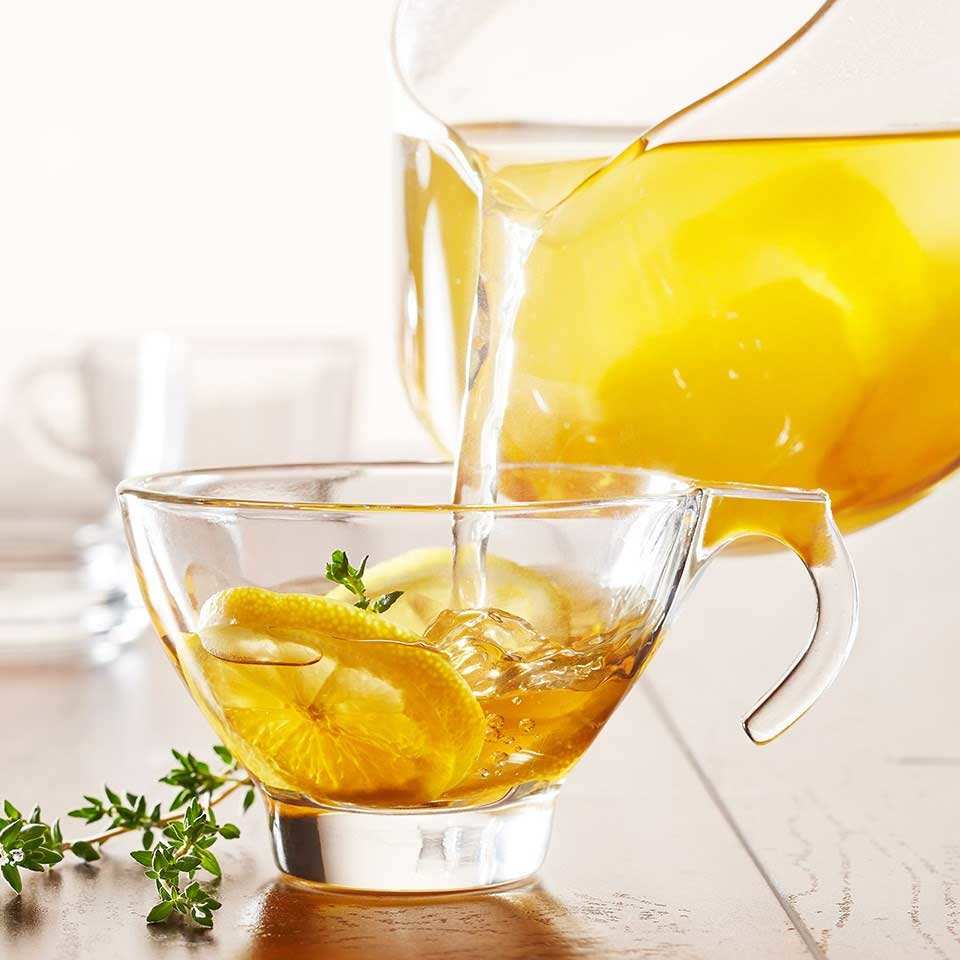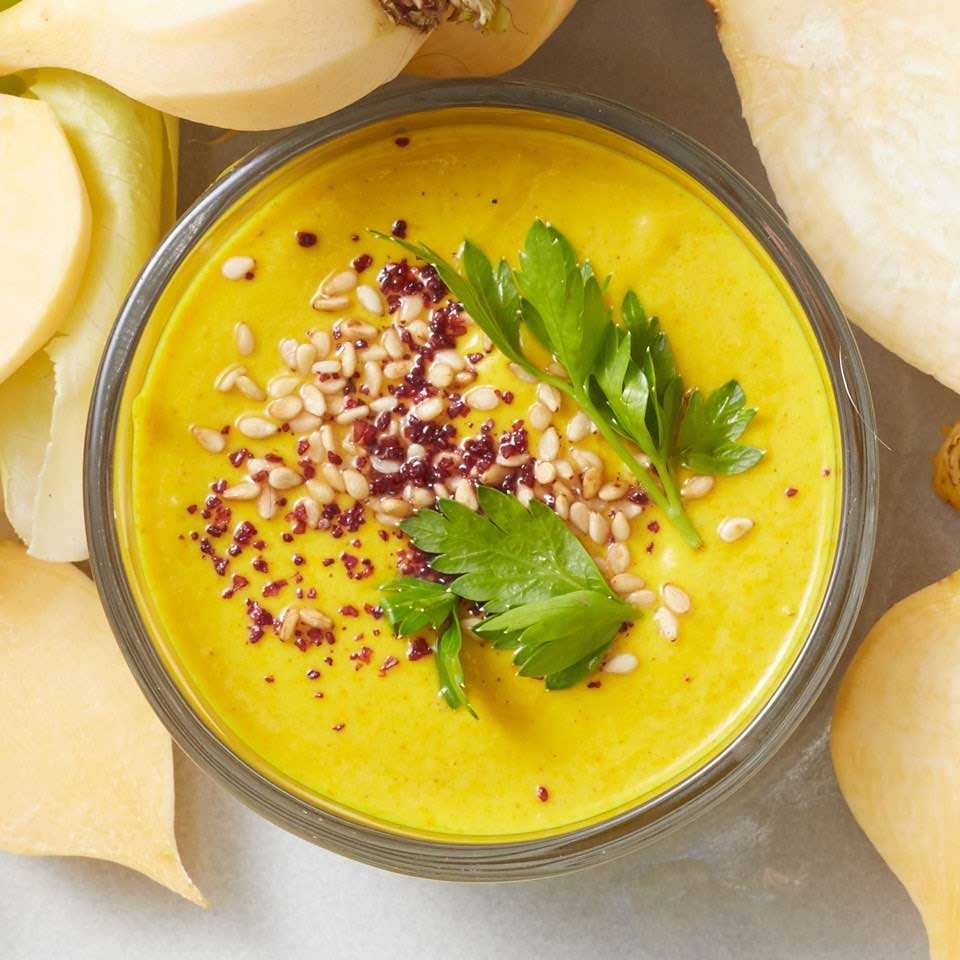
These two tubers are healthy-food rock stars on their own, but together they are quite the culinary pair. We have the benefits of turmeric and ginger, as well as several mouthwatering recipes to help you enjoy them.
Turmeric and ginger have been consumed for centuries and, over time, they have built up quite the reputation for being super healthy. We have all the details about what they are, their health benefits, and how you can start eating more of them today.
What Are Turmeric and Ginger?
Turmeric and ginger aren’t new foods; both have been consumed for thousands of years. Ginger has its origins in ancient China, where it was used as both a spice and a medicine. It was long considered an herbal remedy for motion sickness, nausea, pain and digestive distress. From there, it spread through Asia and on to Europe and is now a household staple for many. Turmeric has also been historically grown in southeast Asia, with India still being the primary producer. Both foods come from the part of the plant called the rhizome, a stem that grows underground and produces shoots off its sides, similar to a root system. Both plants actually grow beautiful flowers above the ground when they are ready to be harvested.

Health Benefits of Turmeric and Ginger
Pain-Relieving
As was hypothesized by traditional Chinese medicine, turmeric and ginger can have pain-relieving effects for a variety of ailments. Curcumin, the superstar anti-inflammatory compound in turmeric, has been found to help relieve the symptoms of painful inflammatory diseases, like arthritis and colitis. A study in BMC Complementary and Alternative Medicine found that, for women with bad period symptoms, ginger can help. Students in their study who took a 500-mg capsule of ginger root powder three times a day for five days had significantly less pain with menstruation than those who didn’t. The Journal of Pain found these benefits can even translate to enhanced athletic performance and relief from soreness after exercise. Consuming just 2 grams of ginger, heated or raw, daily for 11 days reduced pain and perceived effort for study participants.
Antioxidant-Rich
Ginger and turmeric are both excellent sources of protective compounds. The antioxidants found in ginger may help prevent heart disease and cancer, especially when paired with garlic. Turmeric packs even more of an antioxidant punch. One 2017 review found that turmeric may have close to seven times more antioxidants than ginger. There are several ways to assess antioxidant capacity, and each yields slightly different results. However, both turmeric and ginger are regarded as some of the most antioxidant-rich spices out there. To take it a step further, pair them with some of the Best Antioxidant-Rich Foods.
Anti-Inflammatory
Individually, ginger and turmeric both have impressive anti-inflammatory benefits. The compound in ginger called gingerol is responsible for its pungent flavor, and its protective properties. Gingerol has been found to improve inflammatory conditions from a common cold to inflammatory bowel disease. Being from the same family of plants, turmeric is no exception. Curcumin is, again, center-stage when it comes to anti-inflammation. Its effectiveness has led to curiosity about developing curcumin-based drugs for disease treatment.
Like many classic food pairings, ginger and turmeric truly are better together. A study in the International Journal of Rheumatic Diseases tested the effects of a ginger-turmeric mixture on symptoms of rheumatoid arthritis. Though the study was done on rats, the anti-inflammatory tonic was more effective than the drug indomethacin, which is commonly used to manage arthritis symptoms. Ultimately, they found that ginger and turmeric together were effective for reducing arthritis severity and complications. These anti-inflammatory benefits also affect our endocrine system, whose hormones regulate many bodily functions. One study found that through these hormonal effects, ginger and turmeric may influence how fat is distributed around our bodies.
Heart-Healthy
Along with protecting your brain and muscles, these tuberous roots can help keep your heart healthy. High blood pressure can occur when plaque and platelets get stuck in your blood vessels. This increases the stress on your heart when it pumps blood, which increases your blood pressure. Ginger has been found to improve blood circulation, which helps prevent plaque and blood clots from getting stuck. Turmeric also has blood pressure-lowering effects, mostly related to reducing inflammation. And, some research has found that turmeric can reduce the cholesterol that is absorbed in your gut, which can protect from other heart conditions as well, such as coronary heart disease. More research is needed to establish a relationship between turmeric and cholesterol.
Cancer-Blocking
The journal JCO Global Oncology published a study analyzing which spices may play a role in preventing cancer. Ginger and turmeric quickly came to the top of the list. They both block the formation of the known carcinogens nitroamines and nitroamides. These are the same compounds that caused people to become suspicious of nitrites in cured meats. Turmeric apparently boasts some additional benefits for smokers as well. The root helped cigarette smokers excrete the carcinogenic compounds that were dangerous to their health while also increasing protective compounds, like antioxidants, in the body. In light of all of the research about environmental toxins, fresh herbs and spices are a great protective addition to your plate.
Stomach-Soothing
Ginger is a well-known home remedy for nausea, but how does the science stack up? Several studies have looked at why ginger soothes an upset stomach, and the consensus is that, in short, it works. Gingerol, the antioxidant compound in ginger, communicates with the serotonin (aka the “feel good” chemical) receptors in your brain to help relieve discomfort. This can have therapeutic implications for pregnant women and people on chemotherapy. One 2016 study even tested both of these populations and found promising results.
Immune-Boosting
Ginger is often recommended for a common cold, and the science is there to back it up. A study in the Journal of Ethnopharmacology suggests that ginger affects airway mucus production to discourage viral attachment. When flu season comes around, it could be worth stocking up on turmeric, too. A study in International Immunopharmacology found that the same compounds that give turmeric its anti-inflammatory benefits may protect you from influenza and pneumonia. It may be worth brewing some ginger-turmeric tea the next time you are feeling under the weather.

How to Use Turmeric and Ginger
Both turmeric and ginger can be found in many grocery stores, sold as a whole root or powder. The powder has a longer shelf life than the whole roots, and whole roots should be stored in a dry, dark place, such as a brown paper bag. You can look to their origins to see why their flavors are prominent in several kinds of Asian and Southeast Asian cuisine. In fact, turmeric and ginger are both main ingredients in several kinds of curry powder.
Turmeric and ginger are staple flavors for stir-fries, curries, stews, teas, and much more. Both also make flavorful, tangy additions to smoothies and juices. Just make sure to peel them both before using them. Turmeric is more brightly colored but milder in flavor than ginger. For this reason, turmeric should be used in larger amounts, and pungent, spicy ginger should be used more sparingly. That super-healthy compound in turmeric (curcumin) is difficult for our bodies to absorb on its own. Luckily, it becomes 2,000 times better absorbed when paired with black pepper, so be sure to add a dash of pepper to your curries or golden milk.
Bottom Line
Turmeric and ginger offer numerous benefits. They are yummy on their own but also make a delicious culinary pairing and may even boast some synergistic health benefits. From boosting immunity to relieving pain, there are several reasons to mix turmeric and ginger into your foods.
Important Notice: This article was originally published at www.eatingwell.com by Jessica Ball, M.S., RD where all credits are due.
Disclaimer
The watching, interacting, and participation of any kind with anything on this page does not constitute or initiate a doctor-patient relationship with Dr. Farrah®. None of the statements here have been evaluated by the Food and Drug Administration (FDA). The products of Dr. Farrah® are not intended to diagnose, treat, cure, or prevent any disease. The information being provided should only be considered for education and entertainment purposes only. If you feel that anything you see or hear may be of value to you on this page or on any other medium of any kind associated with, showing, or quoting anything relating to Dr. Farrah® in any way at any time, you are encouraged to and agree to consult with a licensed healthcare professional in your area to discuss it. If you feel that you’re having a healthcare emergency, seek medical attention immediately. The views expressed here are simply either the views and opinions of Dr. Farrah® or others appearing and are protected under the first amendment.
Dr. Farrah® is a highly experienced Licensed Medical Doctor certified in evidence-based clinical nutrition, not some enthusiast, formulator, or medium promoting the wild and unrestrained use of nutrition products for health issues without clinical experience and scientific evidence of therapeutic benefit. Dr. Farrah® has personally and keenly studied everything she recommends, and more importantly, she’s closely observed the reactions and results in a clinical setting countless times over the course of her career involving the treatment of over 150,000 patients.
Dr. Farrah® promotes evidence-based natural approaches to health, which means integrating her individual scientific and clinical expertise with the best available external clinical evidence from systematic research. By individual clinical expertise, I refer to the proficiency and judgment that individual clinicians acquire through clinical experience and clinical practice.
Dr. Farrah® does not make any representation or warranties with respect to the accuracy, applicability, fitness, or completeness of any multimedia content provided. Dr. Farrah® does not warrant the performance, effectiveness, or applicability of any sites listed, linked, or referenced to, in, or by any multimedia content.
To be clear, the multimedia content is not intended to be a substitute for professional medical advice, diagnosis, or treatment. Always seek the advice of your physician or other qualified health providers with any questions you may have regarding a medical condition. Never disregard professional medical advice or delay in seeking it because of something you have read or seen in any website, video, image, or media of any kind. Dr. Farrah® hereby disclaims any and all liability to any party for any direct, indirect, implied, punitive, special, incidental, or other consequential damages arising directly or indirectly from any use of the content, which is provided as is, and without warranties.








